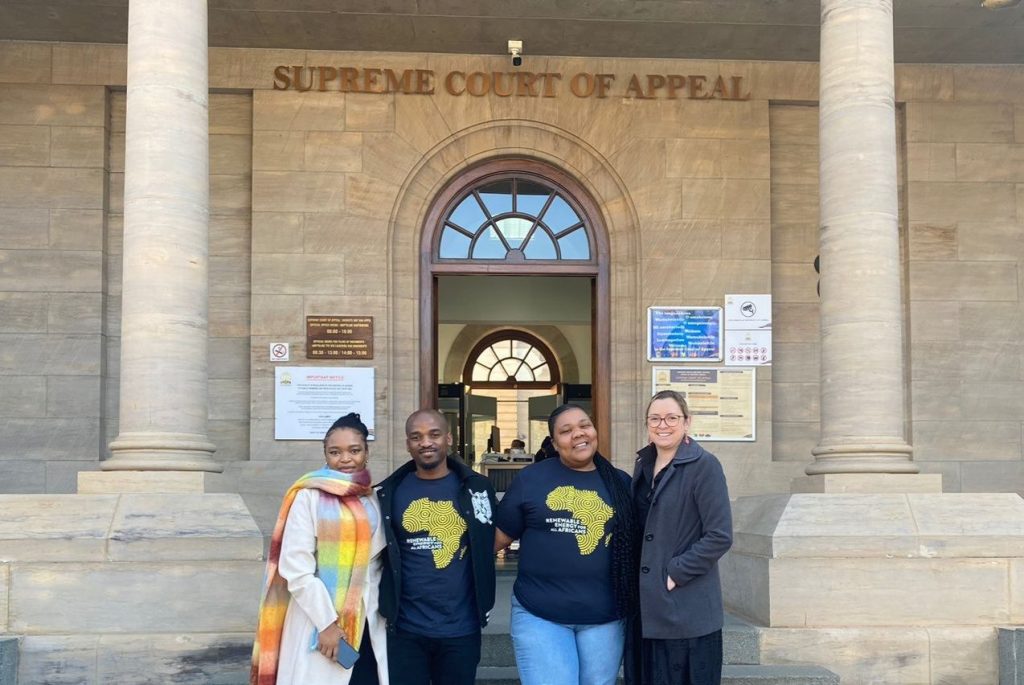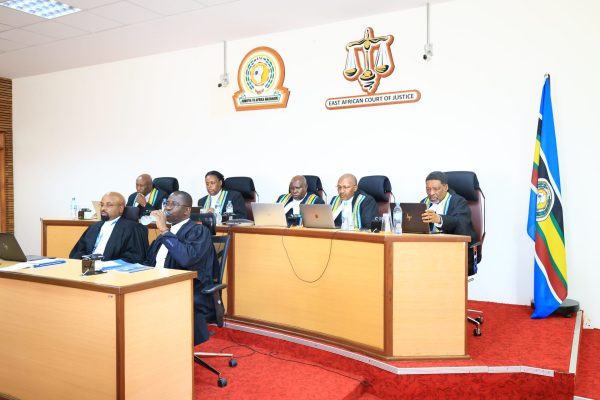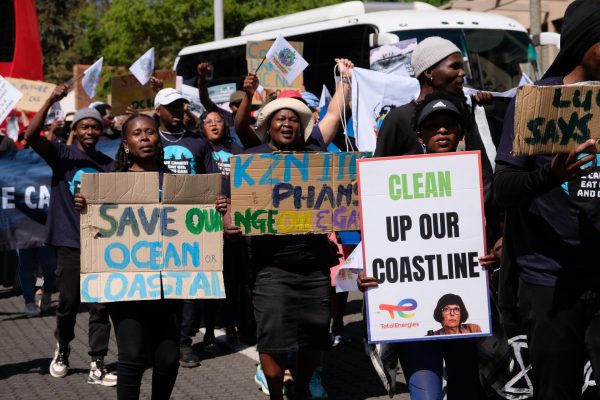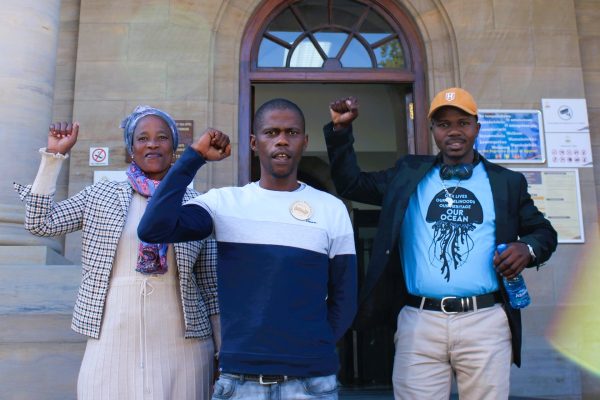17 September 2025: Civil society organisations have welcomed a ruling by the Supreme Court of Appeal, that has denied state-owned enterprise, Eskom, authorisation to build a 3000MW gas-to-power plant in Richards Bay.
The SCA overturned the decision of the Pretoria High Court, which upheld an Environmental Authorisation granted to Eskom by the Department of Forestry Fisheries and the Environment (DFFE), despite acknowledging deep flaws in the public participation process.
South Durban Community Environmental Alliance (SDCEA) and groundWork, are hailing the judgement an outright victory for the affected communities of Richard’s Bay, who were not adequately consulted about the project.
SDCEA and groundWork argued that the Environmental Impact Assessment upon which the Environmental Authorisation was granted, was flawed, not only for failing to conduct consultation in the language of local residents, but also in that it did not consider the climate change impacts of the full lifecycle of the gas-to-power plant, or whether renewable energy options could achieve the same energy objectives. The proposed gas-to-power plant was set to be fuelled by gas via a pipeline installed from the Richards Bay Port with the aim to supply up to 3,000MW of energy for a mid-merit facility. The source of the gas was unclear.
In August 2024 the South Durban Community Environmental Alliance (SDCEA) and groundWork, supported by Natural Justice, represented by environmental law firm, Cullinan & Associates and a team of advocates, took the matter to the SCA in Bloemfontein to challenge a Pretoria High Court judgment that had previously declined to set aside the environmental authorisation granted to Eskom for the gas power plant.
In the SCA judgment shared, the court confirmed that public participation is pivotal to the fulfilment of the right to a healthy environment. To be effective, public consultation must be conducted in good faith, through culturally appropriate measures and procedures. Eskom and its environmental consultants, Savannah Environmental, did not do so.
The SCA also confirmed that renewable energy alternatives should have been considered, and that the cumulative impacts associated with the extraction and transportation of gas should have been part of the assessment. The Minister had also failed to consider that the government had already determined that any gas power should be provided by Independent Power Producers, not Eskom.
As a result, the SCA crafted a remedy that would enable members of the public to participate meaningfully in any application process, which necessitates a fresh application by Eskom for authorisation once the required public participation has taken place and once the various requirements which had not been complied with, have been attended to. The environmental authorisation was therefore set aside. “The effect of this order is that the authorisation is a nullity”, reads the judgment.
This matter was first heard in the Pretoria High Court in August 2022 and was considered a landmark case, as it was the first time that a gas-to-power plant had been challenged in a court in South Africa.
At the time, CSO’s raised concerns about the inadequate assessment of the climate change impacts of the project and called for the environmental authorisation to be declared unlawful and set aside, based on inadequacies within the Environmental Impact Assessment (EIA) and a flawed public participation process. None of the communications during the public participation process had been conducted in the home language of the majority of people in the area (isiZulu).
In October 2022, the Pretoria High Court (despite finding the Applicants’ 5th review ground to have merit – impliedly justifying a review of the impugned decisions) dismissed the review application and refused to set the impugned decisions aside.
But, it did grant ancillary orders to the effect that the decision to grant the environmental authorisation should be published in isiZulu and the communications in future EIAs for the gas terminal and pipeline should also be in isiZulu. This unfortunately meant that the environmental authorisation remained valid.
Desmond Desmond D’sa from SDCEA said: “The case that was won at the Appeal court is a vindication of justice for people and the environment. Eskom for too long, as a state parastatal has gotten away with injustices and people that have lived alongside its facilities will suffer from the high costs of the tariffs, high levels of pollution. We welcome the judgment from the Appeal court and we certainly believe that Eskom must now move away from fossil fuels to a just energy transition”.
Siphesihle Mvundla, Climate & Energy Justice Campaigner at groundWork said: “We welcome the decision to uphold our appeal against Eskom’s proposed CCGT project in Richards Bay. This victory affirms that communities and the environment cannot be sidelined in the rush to lock South Africa into another generation of fossil fuel dependency. Eskom must now turn its focus to a genuine transition – one that prioritises renewable energy, energy efficiency, and the rights of workers and communities most affected by pollution and climate change. South Africa cannot afford another round of false solutions that deepen inequality, undermine environmental justice, and worsen the climate crisis. This decision is not just a win for SDCEA and groundWork – it is a win for people and for the planet”.
Melissa Groenink-Groves, Defending Rights Programme Manager at Natural Justice said: “This judgment is a major victory. It not only recognises the importance of holding the government accountable for considering all environmental legal requirements, it also provides hope for a future that will give communities a voice in the kind of developments and investments that impact their livelihoods, their health and well-being and their environments. We welcome the judgment and will continue to support communities and CSOs who speak up against flawed processes, who stand up against non-beneficial developments, and who fight for their rights to thrive in an environment that benefits all.”
Lucien Limacher, Head of Programmes at Natural Justice said: “Natural Justice welcomes this landmark judgment, which firmly places communities’ rights and environmental justice at the centre of decision-making processes in South Africa. The Supreme Court of Appeal’s affirmation that NEMA is the guiding framework for all environmental governance, even when it impacts other areas of law, sends a powerful message: development cannot come at the expense of people’s rights, their health, and the ecosystems that sustain them. We stand with communities like those in South Durban and Richards Bay, who have fought tirelessly to ensure their voices are heard. We are encouraged that the judiciary has reinforced the principle that public participation and climate considerations are not optional, but fundamental obligations in building a just and sustainable future.”
Paul-Michael Keichel, Cullinan & Associates Inc. said:”I’m extremely happy with this result, even though we waited for a long time for it. Clearly, our esteemed SCA Justices had many important matters to grapple with. State functionaries need to understand that their policies do not trump our laws – and that, when in doubt, they must favour nature. This is a firm shove in the right direction.”
Background:
· December of 2019 – Eskom Holdings SOC granted environmental authorisation.
· 2 August 2022 – Case heard to the Pretoria High Court.
· 6 October 2022 – Pretoria High Court dismissed the review application and refused to set the impugned decisions aside. Court orders that environmental authorisation should be published in isiZulu and the communications in future EIAs for the gas terminal and pipeline should also be in isiZulu. Environmental authorisation remained valid. SDCEA and groundWork applied to the Pretoria High Court for leave to appeal.
· 17 January – Leave to appeal hearing.
· 18 January 2023 – CSOs’ application dismissed on the basis that he was of the view that another court would not come to a different conclusion.
· 28 April 2023 – SCA grants leave to appeal.
· 30 August 2024 – Appeal hearing in the SCA.
· 17 September 2025 – SCA judgment
Find the judgement here on the SCA website.
Find the media summary of the judgment on the SCA website here.
SCA Hearing: CLICK HERE







